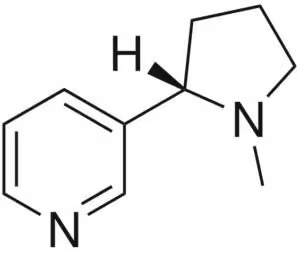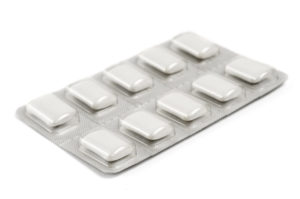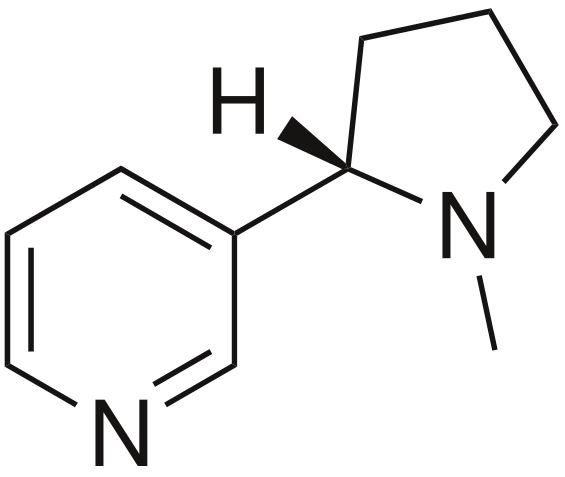Table of Contents
Click the image above or watch on YouTube
Key Takeaways
- Nicotine has been used for thousands of years for its nootropic properties such as improving concentration, memory, motivation, and mood.
- As a nootropic, nicotine is typically dosed at 1 – 2 mg
- Despite the cognitive benefits of nicotine, it is not recommended to smoke tobacco due to the harmful effects.
- Nicotine can be addictive and cause side effects like increased heart rate, high blood pressure, gastrointestinal problems, and it may promote tumor growth, so its use requires caution.
Nicotine (3-(1-Methyl-2-pyrrolidinyl) pyridine) is an alkaloid found in tobacco leaves. And has been used by humans for its psychoactive (nootropic) properties for thousands of years.
But it is only in the last several decades that nicotine’s mechanism of action in the brain has been revealed.
Nicotine works primarily by upregulating nicotinic acetylcholine receptors (nAChR) in the brain. Increasing neural signaling of neurotransmitters and boosting alertness, cognition and memory.
Studies have shown however that this upregulation of nAChR is dose dependent. And too much nicotine desensitizes these receptors.[i] So low doses of nicotine are key in using nicotine as a nootropic for cognitive benefit.
Since we’re investigating nicotine as a nootropic here, it’s important to point out that I am not encouraging smoking. Smoking tobacco has been shown to increase cognition.
But the harmful effects of tobacco have been proven extensively.[ii] Including this study that showed life-time smokers have less gray matter in the prefrontal cortex compared to non-smokers. Affecting the brain’s reward, impulse control and decision-making circuits.[iii]
Nicotine as a nootropic helps:
- Memory. Nicotine improves short and long-term memory. Nicotine affects nicotinic receptors which increases the use of neurotransmitters that helps with memory formation. And induces long-term potentiation which helps encode long-term memories.
- Neurotransmitters. Nicotine binds to nicotinic acetylcholine receptors in the brain. Boosting the release of acetylcholine (ACh), dopamine, serotonin, and glutamate. Affecting alertness[iv], attention, cognition, memory and mood.
- Brain Optimization. Nicotine modulates the connectivity and structure of brain networks. And improves whole-brain communication efficiency. Boosting overall cognitive and brain function.[v]
Overview
Nicotine (3-(1-Methyl-2-pyrrolidinyl) pyridine) is an alkaloid found most famously in tobacco leaves. But nicotine is also present in very small amounts in plants from the Solanaceae or nightshade family including potatoes, tomatoes and eggplant.[vi]

Nicotine acts on acetylcholine (ACh) receptors in your brain. Stimulating and regulating the release of a host of neurotransmitters including serotonin, dopamine and norepinephrine.
New drugs derived from nicotine and the research on nicotinic receptors are in clinical trials for Alzheimer’s, ADHD, anger management, anxiety, depression, schizophrenia, Tourette Syndrome and wound healing.[vii]
As a nootropic, we’re talking about using a nicotine lozenge or gum for cognitive function enhancement. I am NOT talking about smoking tobacco.
Smoking is the cause of 5 – 6 million deaths per year. Affecting 18 different organs in your body. But it’s not the nicotine in tobacco that kills.
The biggest issue with using nicotine as a nootropic is that it can be addictive. But it’s not the nicotine that causes cancer. Nicotine however could be a “tumor promoter”.
Nicotine binds specifically to the nicotinic acetylcholine receptor (nAChR) in your brain. And it deregulates essential processes like regulation of cell proliferation, apoptosis (programmed cell death), migration, invasion, angiogenesis, inflammation and cell-mediated immunity of stem cells, adult tissues and cancer cells.[viii]
As a nootropic, taking nicotine in smalls doses (i.e. 1-2 mg) and used occasionally helps when you need that cognitive boost. If you have cancer or a tendency to tumor growth you should avoid using nicotine.
How does Nicotine work in the Brain?
Nicotine boosts brain health and cognitive function in several ways. But two in particular stand out.
- Nicotine boosts memory. Nicotine binds to presynaptic nicotinic acetylcholine receptors in the brain. And boosts the release of acetylcholine (ACh), dopamine, serotonin, and glutamate.[ix] Neurotransmitters known to be involved in cognitive processes.
Problems with cholinergic signaling has been implicated in neurologic disorders including schizophrenia, ADHD and addiction. And much of the study of nicotine’s effects on cognition has been done looking for treatments for these disorders.[x]
The National Institute of Drug Abuse conducted a meta-analysis of 41 double-blind, placebo-controlled studies between 1994 and 2008. The analysis found significant positive effects of nicotine on fine motor performance, alertness, attention and accuracy, response time, short-term and working memory.[xi]
- Nicotine improves attention. Attention deficits are often associated with those dealing with ADHD. The inability to focus can cause all kinds of problems both in relationships, and on the job.
Nicotine has been shown to improve attentiveness in smokers. And helps alleviate attention deficits in Alzheimer’s Disease, schizophrenics and adults with ADHD.
A double-blind study conducted at Duke University Medical Center used nicotine patches to see if it would improve attentiveness in non-smoking adults without attention deficits. Subjects received 7 mg of nicotine per day using a transdermal patch for a 4 ½ hour morning session.
Nicotine significantly decreased the number of omission errors during testing. And in this study, decreased the variance in “hit reaction time” which is used a measure of attentiveness.
The study showed that nicotine reduced attention deficit, and even improved attentiveness in normal adult non-smokers.[xii]
How things go bad
As we get older, our brain chemistry and energy metabolism changes.[xiii]
↓ Acetylcholine signaling in the brain declines
↓ Dopamine, norepinephrine, epinephrine and serotonin levels decline
↓ Alertness, attention and memory declines
↑ Anxiety, depression and stress increases
All of these age-related changes are contributing factors to the neurodegenerative diseases of aging, including Alzheimer’s and dementia.
Nicotine benefits
Nicotine boosts levels of dopamine, epinephrine (adrenaline), norepinephrine and serotonin. And human cell lines in test tube studies as well as animal studies show nicotine stimulates the growth of new blood vessels. Even increasing the number of red blood cells.
Nicotine rapidly crosses the blood-brain barrier. Within 20 seconds of putting a nicotine lozenge under your tongue. It has the fastest action of any nootropic I have reviewed here on Nootropics Expert.
Alpha brain waves increase with nicotine which provides a relaxed state associated with super-learning, flow states and joy.[xiv]
Nicotine stimulates electrical and neurotransmitter activity throughout your brain. Helping alertness, mood, motivation, selective attention, sustained attention, and decreases distraction.[xv]
Nicotine helps pre-attentional processing which is your ability to detect information. It brings you down when you’re up. And it brings you up when you’re down. And it helps you cope with stress and anxiety.
And nicotine improves short-, long-, and working memory processes.[xvi]
How does Nicotine feel?
Neurohackers report nicotine improves mental clarity and motivation. Mood swings are minimized and less anxiety.
Concentration and focus significantly get a boost with nicotine as a nootropic.
All forms of memory get a boost with nicotine. Short and long-term memory. And working memory. Nicotine induces long-term potentiation in the hippocampus which is the basis for the neuroplasticity that helps encode long-term memory.[xvii]
The key with nicotine is to use low doses. And only use it occasionally. Too much nicotine desensitizes the alpha-7 nicotinic acetylcholine receptor. So tolerance is an issue. But your receptors recover fairly quickly if you give them a break for a day.
Nicotine Clinical Research
Much of the research conducted with nicotine was done with cigarette smokers. The studies were to determine the effects of abstinence (quitting smoking) on cognition. Or funded by tobacco companies out to prove smoking was good for you (i.e. improved cognition). Cigarette smoke is harmful.
So keep an open mind when reviewing these studies. My intent is certainly not to encourage smoking. But to show the effects of nicotine regardless of the delivery system to the human brain.
Nicotine boosts IQ
Researchers in New Zealand conducted a trial with 10 women and 6 men ranging in age from 18 – 32 years. All participants were smokers and were instructed not to smoke during the 2-hour period prior to the experiment.
Each subject completed the even and odd numbers of the Raven’s Advanced Progressive Matrices (APM) test in two sessions. APM is a test to measure intelligence (IQ).
In each of 2 experimental sessions, subjects were given 20 minutes to complete the assigned half of the APM. Before beginning the test, subjects took 6 puffs of a medium (0.8 mg) cigarette every 20 seconds. After 10 minutes, subjects were prompted to take 2 additional puffs.
Results of the experiment showed that APM scores were significantly higher in the smoking session compared to the non-smoking session. Suggesting that nicotine acts to enhance intelligence.[xviii]
Another study at the University of Colorado may explain part of this boost in IQ. Nicotine was found to increase the efficiency of neural communication between areas of the brain involved in cognition. And even the rest of the brain.[xix]
Nicotine improves typing speed
 Researchers conducted 5 experiments to study the effects of using 2 mg of nicotine on keyboard typing speed. In study after study nicotine produced a reliably consistent increase in typing speed.[xx]
Researchers conducted 5 experiments to study the effects of using 2 mg of nicotine on keyboard typing speed. In study after study nicotine produced a reliably consistent increase in typing speed.[xx]
Nicotine will also improve and increase the speed of your handwriting. Scientists in Germany noted that nicotine has consistently been shown to improve psychomotor performance. So they recruited 38 smokers and 38 non-smokers to participate in a study.
Both groups received gum containing 0, 2 or 4 mg of nicotine. And their handwriting performance was assessed after they chewed the nicotine gum. Subjects were asked to perform a simple writing task. Movement time, velocity and acceleration of handwriting movements were measured.
Nicotine reduced movement times, increased writing velocity and more fluid handwriting movements were observed. The results suggested that nicotine can enhance psychomotor performance to a significant degree in a real-lie motor task.[xxi]
Nicotine boosts memory
Nicotine has been shown to improve short-term and working memory in several studies. In this study conducted in the UK, researchers recruited 60 smokers and 60 non-smokers in a double-blind procedure.
Half of the subjects chewed nicotine gum and the other half chewed a placebo prior to performing a memory task. Results showed that nicotine significantly improves short-term memory.[xxii]
Nicotine for the treatment of ADHD
Several studies have shown the benefits of nicotine in treating the symptoms of ADHD. Focusing and memory break down in those of us with ADHD and ADD. And treatment with Ritalin, Adderall or other stimulants often corrects this inattentiveness and memory impairment. But it does nothing for the accompanying depression and anxiety.
And this is the reason many Adult ADHD sufferers smoke. This study showed that using a nicotine patch not only helped decrease anxiety and depression symptoms of ADHD. It also helped smokers stop using tobacco products while taking care of their ADHD symptoms.[xxiii]
In this study, nicotine was compared to the effects Ritalin and or a placebo had in treating ADHD. Nicotine improved performance and reduced errors. It decreased depression, and decreased overall severity of ADHD symptoms.[xxiv]
Another double-blind, placebo-controlled trial worked with 6 smokers and 11 nonsmokers with Adult ADHD. Nicotine decreased ADHD symptoms, increased vigor, and improved reaction time.[xxv]
Nicotine Recommended Dosage
Nicotine as a nootropic is dosed at 1 – 2 mg on an as needed basis.
Nicotine gum typically comes in 2 – 4 mg. You can cut a 4 mg piece of gum in half for a 2 mg dose. Gum releases the nicotine dose over the course of 20 – 30 minutes.
The problem with nicotine gum is aspartame along with other unhealthy sweeteners.
Nicotine patches come in varying strengths and usually contain more nicotine than gum or lozenges. Neurohackers (contrary to package warnings) cut the patch to size depending on the dose they want to use.
My preferred method is nicotine lozenges. Mini-lozenges are best because they’re not full of toxic chemicals like larger lozenges. The 2 mg mini-lozenge cut in half provides cognitive benefits within 10 – 20 minutes.
Nicotine Addiction & Other Side Effects
Nicotine is addictive primarily because it boosts levels of dopamine in your brain.[xxvi] Not nearly as addictive as smoking tobacco or chewing tobacco but addictive nonetheless.
Nicotine can cause increased heart rate, high blood pressure, dizziness, cough, sneezing, sinus problems, upset stomach, constipation, and headaches.
Nicotine does not “cause” cancer. But may be a tumor promoter. So if you had or currently have cancer you should avoid nicotine.
If you are dealing with a gut infection of H pylori bacteria, you should not use nicotine until you get this problem under control.
Type of Nicotine to buy
Nicotine used as a nootropic comes in gum, inhalers, lozenges, and transdermal nicotine patches.
See “Nicotine Recommended Dosage” for specific dosing instructions.
Nicotine Gum & Lozenges
Mini-lozenges are the safest and best form for nootropic use. I have tried and recommend the nicotine lozenges or gum by Lucy Nicotine. Lucy uses pharmaceutical grade nicotine and natural ingredients only in their lozenges and gum. Check them out here: Lucy.co Nicotine.
Nicotine Spray
Nicotine spray is a newer option you may want to try. You get a 1 mg dose for each spray under your tongue (sublingually). Great for a quick cognitive boost and burst of energy. There’s about 100 sprays in each container.
Nicotine Vaping
Vaping is another option. But it can come with a host of potential issues if you’re not familiar with vaping. The safest option is rebuildable coils using stainless steel wire and organic cotton with vegetable glycerin as your nicotine base. And keeping the temperature low and power less than 4 volts.
Of course there is also cigarette smoking and chewing tobacco for your nicotine dose which I DO NOT recommend.
Nootropics Expert Recommendation
Nicotine 1 – 2 mg per dose
 I recommend using Nicotine as a nootropic supplement.
I recommend using Nicotine as a nootropic supplement.
Your body does not make nicotine on its own. So if you are going to supplement with nicotine, you must take it as a supplement.
Nicotine is helpful for those dealing with short-, long-term and working memory problems, low energy, depression or anxiety.
Nicotine is especially helpful for dealing with the symptoms of Adult ADHD. Nicotine can help relieve many of the symptoms of ADHD. And is a good compliment to your existing ADHD meds.
While nicotine is a powerful cognitive enhancer, it is also addictive and can lead to tolerance and withdrawal symptoms in some people. So caution is advised. And if you’re prone to addiction please stay away from nicotine as it can lead to nicotine addiction.
As neurohackers, we have great acetylcholine agonists available to us if you don’t want to experiment with nicotine. Most of the racetams will boost acetylcholine use in the brain.
We suggest starting with a dose of ½ – 1 mg of nicotine in mini-lozenge or spray form. Nicotine will compliment nearly everything in your current nootropic stack.
There is no benefit to dosing more than 2 mg of nicotine for cognitive benefit. And too avoid addiction and tolerance we suggest only using nicotine occasionally.
Lucy.co for example sells nicotine 4mg lozenges. Use a pill splitter and cut them in half for a 2 mg nootropic dose.










Join The Discussion - 124 comments
Marcus
March 12, 2019
Hi David,
Thank you for this nootropics website. I just found it on YouTube. I have used nicotine patches intermittantly for years now.
I encourage people who have thought about trying but worried about it being addictive it to give it a try.
It has saved my marriage numerous times. It seems to be the only thing that consistantly works within minutes to control my tempor.
Sometimes I over react to my wifes complaining or just talking too much by yelling at her. Not good 🙁
I have always had short term and long term memory problems in addition to getting distracted very easily. For years I would do typing drills every morning and listen to super learning music throughout the day to calm my mind and stay focused.
I now find the patch calms my nerves, reduces all forms of minor physical pain, and improves my focus and memory. I end up feeling like I’m a normal human being, happy focused and energetic. Most of all it helps me to Not overreact and get upset easily.
I have experimented al lot with different does. I use a 4 to 7 mg patch for 6 to 12 hours during the day. I do not use it at night because it keeps me up. I usually cut up a 21 mg or 14 mg patch. Their cheap. I get them at Walmart.
I used to smoke on and off for 25 years but stopped completely about 20 years ago.
I have never found it to be addictive or create a craving for cigarettes.
You are the only person that has completely validated what I have been telling people about the patch for years.
Thank You!
Sincerely,
Marcus
David Tomen
March 12, 2019
Marcus, thanks for your report. Another you could try and many find helpful is Lithium Orotate: https://nootropicsexpert.com/lithium-orotate/. You could use both.
Laurie
March 11, 2019
I’m trying to quit smoking by my brain slows down so bad I always go back to smoking, is there a nootropic that works in the brain similar to nicotine?
David Tomen
March 11, 2019
Laurie, nicotine actually has its own receptors in your brain. The only real nootropic alternative are nicotine lozenges. Look for the ‘mini’ lozenges because the larger ones are loaded with additives which are toxic.
Jacob
February 26, 2019
Just an FYI, I did took half a piece of gum (cause it was 4 mg) and I can’t say I felt any effect. Maybe I am expecting too much. Thanks for your help.
Richard Hubbard
November 1, 2018
How long does the effect last?
David Tomen
November 1, 2018
Richard, the half-life of nicotine is about 2 hours. If you put a nicotine lozenge under your tongue (sublingual) it crosses the blood-brain barrier and reaches your brain within seconds.
Jacob
February 18, 2019
I got nicotine gum before I read this article. Does it work similar to lozenge. Thanks
David Tomen
February 18, 2019
Jacob, nicotine is nicotine but it’s best to avoid any other additives. The type additives that come in nicotine gum or the larger lozenges. You still get the benefit however. Just keep in mind for next time the ‘mini lozenges’ are safest.
Dan
October 26, 2018
Hello David,
Thank you for all you do. Upon my research I stumbled across this note at the top of a Longecity article (https://www.longecity.org/forum/topic/68542-nicotine-extreme-nootropic/) about nicotine demonstrating the same signs of aging regardless of administration. Naturally this is a concern for me. Do you know anything about nicotine, separate from tobacco, inducing signs of aging?
Thank you
David Tomen
October 27, 2018
Dan, I suggest you read that clinical trial again more carefully (https://www.ncbi.nlm.nih.gov/pubmed/10605870). The study authors concluded that, “The sublingual tablet appears to be a safe form of administration of nicotine with mild and transient effects on the floor of the mouth.”
The Dude
July 15, 2018
Hi David,
Have you had any experience with former smokers using nicotine as a nootropic? I’ve been considering trying it (possibly e-cig, but gum or a lozenge seems safer after reading this), but I’m afraid I’ll try cigarettes again. Let me know your thoughts/experiences.
Cheers
David Tomen
July 16, 2018
Nicotine is addictive. No question about that. It’s why only occasional use is recommended when you really need the cognitive boost.
I think your hesitation in trying nicotine lozenges is a legit concern. That has not been my personal experience. But I can understand how and why a former smoker may not think this a great idea.
John Gough
May 20, 2019
I currently use around 6 to 12 mg nicotine lozenges per day. I just order r lipoic acid and I’m taking alcar with coffee. I don’t take any racetams, my question would be could I use 70 mg or 150 mg of alpha gpc with this morning stack fast of about 2-4 mg nicotine?
David Tomen
May 21, 2019
John, 150 mg Alpha GPC would help most people who don’t get nearly enough choline in their diet to produce acetylcholine. This problem grows as you age as well. I can only see benefits without knowing more about your situation.
Seth
July 10, 2018
Mr. Tomen,
How does the nicotine lozenge interact with adderall? I was prescribed adderall for a year now. Is there any potential side effects combining both or should I spread out the medication from the lozenge?
David Tomen
July 11, 2018
Seth, I’ve not had any issues with nicotine lozenges and Ritalin. But not sure about Adderall. Only way to find out is try it. There’s nothing critically dangerous about combining the two.
The Dude
July 15, 2018
I found this on a forum (link below) and I thought y’all might find it helpful.
Nicotine/cigarettes would seem to potentiate the effects of amphetamine:
“Overall, the present data demonstrate that acute interactions of nicotine and other psychomotor stimulants produce potentiative effects and that these transient interactions may play a role in the frequent co-use and abuse of nicotine and other stimulants.”
The same study’s rationale was that ‘Psychostimulants are often used in close temporal proximity to nicotine and have been reported to enhance acutely nicotine’s desirability in humans.’
Nicotine and amphetamine acutely cross-potentiate their behavioral and neurochemical responses in female Holtzman rats. Jutkiewicz EM, Niccolazzo DM, Kim NM, Gnegy ME (Psychopharmacology Berl. Sept. 2008) PMID:18566803
Jake Estemantes
July 4, 2018
Can you please define occasionally. Does this mean bi-weekly, once a week? Twice a week? Thrice a week?
Thank you
David Tomen
July 5, 2018
Jake, “occasionally” means when I feel like I could use the cognitive boost offered by nicotine.
Doing a podcast is a great example of where everything needs to firing on all cylinders in my brain. And nicotine helps me ‘think on my feet’ and respond quicker to questions.
Think of places where you could use a little boost. Like driving, taking an exam …
But not too often because nicotine is addictive. And if you do it too frequently and quit, you’ll go through withdrawal.